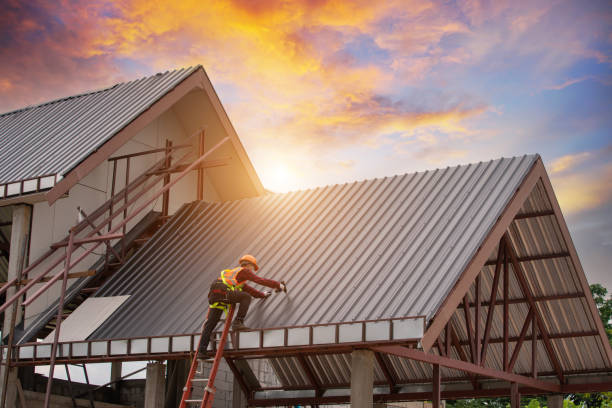Among home maintenance items, the roof is one of the most expensive. Unfortunately, because of the money involved, roofing repairs and replacements attract unscrupulous individuals looking to take advantage of homeowners in need, making roofing scams a real threat. Roofing scams can happen to anyone. These scams often involve deceptive tactics that make the situation seem like a great deal but, in reality, result in shoddy work, stolen money, or worse, exacerbate roof problems or add damage to your property.
Understanding common roofing scams and how to avoid them is essential for protecting your home and bank account. In this guide, Rescue Roofer will show you the most frequent roofing scams we’ve uncovered in our decades of serving homeowners and businesses in Orange County. We will also offer solutions for spotting these scams and provide actionable steps to help you avoid becoming a victim.
What Are the Most Common Types of Roofing Scams, and How Do They Work?
Storm Chaser Scammers:
What Are Storm Chasers?
- These scammers enter like a hailstorm or hurricane, typically appearing after a natural disaster. These scammers offer "emergency" roof repairs at discounted rates or even free inspections, preying on homeowners desperate for help after a storm.
How Do Storm Chasers Operate?
- Storm chasers typically promise quick repairs or replacements, often requesting payment upfront.
- The work is often poorly done or completely unnecessary, leaving homeowners with additional damage or an incomplete job.
How Can I Avoid Storm Chasers?
- Consult with an insurance broker before signing any contracts.
- Rely on an established roofing company, such as Rescue Roofer, to ensure they are appropriately licensed and insured.
- Be wary of high-pressure sales tactics, especially right after a disaster.
Fake Damage Claims:
What Are Fake Damage Claims?
- In this scam, a roofing contractor will approach you, claiming your roof has significant damage, often from a recent storm, even though there is little to no actual damage.
How Fake Damage Claims Happen?
- The scammer may take photos of harmless roof areas and exaggerate or fabricate the extent of the damage. They will use these photos as "evidence," the basis for a significant repair estimate, or to pressure you into filing an insurance claim.
How Can I Avoid Fake Damage Claims?
- Do not rely solely on a contractor's word.
- Obtain a second opinion from a reputable, independent roofer.
- Be cautious of contractors who insist on dealing with insurance claims on your behalf.
"Too Good To Be True" Offers:
What Are "Too Good To Be True" Offers?
- Scammers may advertise shockingly low prices to entice homeowners with deals that seem too good to pass up.
- Scammers may also offer "free" roof inspections or other "free" offers, such as "free upgrades" that are never delivered.
How "Too Good To Be True" Offers Work:
- Watch out for "free warranty" or "extended guarantees that they may not possibly stand by.
- Scammers may also offer low-pressure financing options, such as "0% deals." However, hidden in the fine print are a few surprises: high interest rates once the introductory period ends, hidden fees, or a bait-and-switch with inflated costs down the line.
How To Avoid "Too Good To Be True" Offers?
- Get quotes from multiple roofing companies to understand current prices, and compare quotes from a few different companies.
- Low offers often come with hidden costs, so read the fine print and inquire about promo periods or payment terms to uncover probable surprises.
High-Pressure Sales Tactics:
What Are High-Pressure Sales Tactics?
- High-pressure sales tactics involve contractors pushing homeowners to make quick decisions, often without allowing them time to think or consult others.
- They may also claim that "today is the last day" to get a special deal or that urgent repairs are necessary to prevent immediate damage.
How High-Pressure Sales Tactics Work:
- The pressure these scammers create makes homeowners feel they must act immediately, leading them to sign contracts without fully understanding the terms or having the chance to research the company.
How To Avoid High-Pressure Sales Tactics?
- Take your time before committing to any roofing services.
- Read the fine print on your contract, and don't be rushed into signing them before reading them thoroughly.
- Rely on a reputable company such as Rescue Roofer. They will not pressure you into making hasty decisions.
Unlicensed or Uninsured Contractors:
Why Should You Avoid Unlicensed or Uninsured Contractors?
- These scammers operate without proper licensing or insurance, putting you at risk for poor-quality work or potential liabilities resulting from accidents on your property during the job.
How Do They Operate?
- These contractors may offer lower prices to undercut legitimate companies, but they will leave you vulnerable if something goes wrong, such as an accident or additional damage during the repair.
How To Avoid Unlicensed or Uninsured Contractors?
- Always ask for proof of the contractor's licensing and insurance before hiring them.
- Verify their credentials with your state's licensing board and ensure the company is fully covered for worker's compensation and liability.
How Can I Outsmart Roofing Scammers?

Though these unscrupulous individuals are daring and aggressive, following these straightforward yet effective steps can ensure that a trustworthy and professional contractor completes your roofing project. Outsmarting scammers can save you from substantial cash outlay for jobs with questionable quality. Moreover, you will stay informed and cautious, allowing you to protect your home and finances from fraudsters looking to take advantage, especially when distressed.
Do Your Research:
Ensure that your contractor holds a license, is insured, and is reputable by checking online reviews, contacting previous customers, and verifying credentials through local government offices or reputable directories. Reading reviews on trusted sites like Google, Yelp, or Angie's List can give you insight into the company's work ethic and reliability.
Understand the Contract:
Before signing any contract, ensure all the terms are clear and the contractor's promises are written into the agreement. Watch out for vague language, hidden fees, or verbal promises not included in the contract. A legitimate and reputed company will provide a detailed, transparent contract with clearly outlined expectations.
Avoid Upfront Payments
Never pay the full cost of the job upfront. Agree only on a reasonable deposit, typically no more than 25% of the total price, to ensure that the contractor has an incentive to complete the job to your satisfaction.
Get Multiple Quotes
Always obtain quotes from multiple roofing contractors before deciding on one. Getting multiple quotes will help you understand industry pricing standards and ensure you are not overpaying for services.
Don't Fall Victim To Pressure
A reputable contractor will allow you to take your time and ask questions. Walk away from an offer if you feel rushed or uncomfortable at any point during the process. High-pressure sales tactics are sure signs that you are dealing with a scam.
Protect Your Home with Knowledge and Trusted Partners

Don't be daunted by roofing scams. You can safeguard your home and finances from scammers with the proper knowledge and vigilance. Understanding common scams, researching contractors, and taking deliberate steps to verify their credentials will ensure your roofing project is in trustworthy hands. Remember, a reliable contractor will never pressure you or cut corners at your expense.
At Rescue Roofer, we take pride in delivering honest, professional roofing services backed by decades of experience in Orange County. Our team is here to provide the transparency and quality you deserve, whether you need a roof inspection, repair and restoration, roof replacement, or more.
Contact Rescue Roofer today for a free, no-pressure consultation from an expert roofing advisor to help you protect what matters most - your home and peace of mind.
